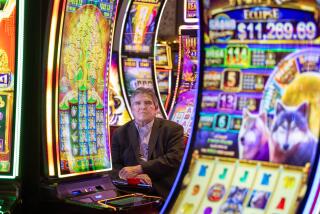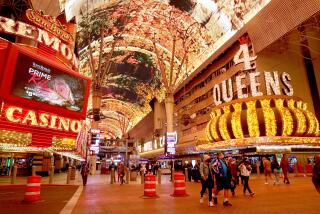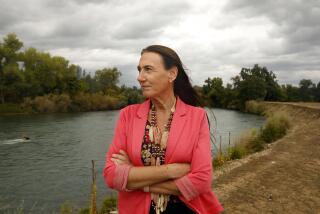Battered Economy : Gambling: Midwest Says ‘Deal Us In’
- Share via
DEADWOOD, S.D. — The narrow, saloon-dotted Main Street, just two blocks long, is a shabby reminder that this gold-rush town was never a symbol of Midwestern wholesomeness. Deadwood and sin have been synonymous for over a century.
Wild Bill Hickok was killed here while playing poker in 1876. Illegal slot machines operated in back rooms well into the 1970s. Calamity Jane, a “soiled dove” of the Old West, plied her trade here in the 1870s. Illegal brothels operated openly on Main Street until 1980. The town, squeezed into a narrow Black Hills gulch, once claimed 77 liquor outlets.
Now faced with deteriorating buildings, crumbling streets, ancient sewers, no land to develop, a stagnant economy, and no possibility of raising taxes, the people of Deadwood believe they’ve struck gold again: gambling.
Card Games, Slots
This summer, small-stakes legal gambling halls will open on Main Street offering tourists their choice of blackjack, poker and slot machines. Slots are also planned for shops from the drugstore to the grocery store.
“We had to do something to get people here to revive our economy,” says Bill Walsh, a Deadwood hotel owner.
And this time Deadwood will not be the region’s moral outcast. Gambling is coming on big in the Heartland.
Iowa, long the symbol of all that is pure and good in the Midwest, is bringing back the river-boat gambler, launching low-stakes gambling on the Missouri and Mississippi rivers and on lakes beginning in 1991.
Iowa’s neighbors, Illinois and Missouri, fearful of being dealt out, are weighing similar legislation. In Ohio the Legislature is weighing a single Las Vegas-type casino for Lorain, an industrial Cleveland suburb. In Indiana, depressed Gary thinks it will come out a winner in an upcoming advisory vote on casino-style gambling.
The Midwest, battered in the 1980s by drought, a farming depression and industrial restructuring, is betting cards, roulette, and dice will revitalize local economies and lure tourists to places like Dubuque and Sioux City.
“We are the rust belt. We have been killed . . . devastated by the loss of manufacturing,” says Dennis Jacobs, an Illinois state senator from Moline, a farm implement manufacturing center hit hard by the weak 1980s farm economy.
“We’re looking for anything we can do in order to ease our burden . . . (Gambling) has become an economic development tool,” adds Jacobs, who introduced gambling legislation in the Illinois Legislature.
Iowa expects gambling to generate more than $1 billion new tourist dollars each year when the floating casinos begin operating. Dubuque, on the Mississippi River, anticipates gambling alone will add $100 million to its economy while stimulating hundreds of millions of dollars in related developments like hotels and restaurants.
Campaigns to introduce casino-type gambling outside of Nevada hit the jackpot this year after a decade of unsuccessful attempts.
“That (the campaigns are) successful is new,” says William Thompson, a professor and gambling industry expert at the University of Nevada’s Las Vegas campus. In fact the last previously successful campaign was in 1976, paving the way for full-service casinos in Atlantic City.
The gambling initiatives have been opposed by some religious leaders in Deadwood and Iowa and by government officials in other places.
“I don’t think that a state like Ohio will benefit economically from casino gambling,” says state legislator James Petro, whose district borders Lorain. “To me, it’s false economic development, not real economic growth. It’s funny money. It’s not manufacturing something. It’s not even providing a service that reaches a broad spectrum of society.”
Last year Detroit voters overwhelmingly rejected a proposal to permit casino-style gambling in the Motor City.
But the popularity of state-run lotteries, a change in the demographics of tourism, a need for economic development and a reluctance by legislators and voters alike to increase taxes for new revenue combined to create the newly favorable atmosphere for gambling.
“Lotteries have made their contribution in an unusual way,” says William R. Eadington, an economics professor at the Reno campus of the University of Nevada and an authority on gambling. “States, by sanctioning lotteries, have legitimized the idea of gambling in peoples’ minds. A generation ago people would have said gamblers are low-lifers and crooks. Now everybody gambles. Participation rates in lotteries are phenomenally high.”
30 State Lotteries
Today more than 30 states have lotteries, up from just one in 1963, and last year Americans wagered an estimated $17 billion on state lotteries.
Lotteries not only helped to make gambling respectable but they opened the way to use other forms of gambling to raise revenues and promote economic development.
“What else could we do?” demands Melodee Nelson, head of Deadwood’s You Bet Committee. “We’re sitting with a population of 2,000. We can’t add taxes. We can’t increase the property tax. What industry is going to come to Deadwood? We’re off the Interstate and 60 miles from the nearest major airport. How else could we generate revenue?”
In Iowa, gambling “is targeted at a number of communities along the (Mississippi) river that have not experienced much of a recovery since the farm recession,” says Bob Arnould, state senate majority leader. “This should be a boon to several of those communities as well as a symbolic point of departure from the past into the future.”
If it gets gambling, Lorain--hard hit by steel plant automation, the downturn in Great Lakes ship building and the closing of a truck manufacturing plant--will use revenues to improve its port, build low-income housing and upgrade the community’s aged infrastructure.
Deadwood and Iowa will limit bets to $5 each but, unlike Deadwood, Iowa will also put a $200 loss limit per passenger per excursion.
“This is more entertainment-style gambling,” Arnould says. “If you’re a serious gambler you’re going to go to Las Vegas or Atlantic City.”
That is precisely the market Lorain is looking at.
“Ohio ranks fourth in the nation in sending people to Las Vegas,” says State Rep. Joe Koziura, whose legislation permitting one casino with unlimited gambling in the Lake Erie city is now in the Ohio Senate. “Why should people from the Midwest, from Illinois, Indiana, Pennsylvania and New York go out of our section of the country to spend their money?”
While Iowa cities are just beginning to see interest by developers and promoters, the hoped for economic development boom in Deadwood is already apparent.
Real estate prices are now two to three times what they were before last November’s state-wide vote amending the South Dakota constitution to permit gambling only in Deadwood. One Main Street building listed for $280,000 before the vote sold for $500,000 last December. Another building appraised at about $40,000 sold for $175,000.
“It’s a seller’s market,” says Ron Island, owner of the town’s only real estate company. “This is a dirty, rundown old town . . . that was slowing dying. At the absolute minimum (gambling) will save the town.”
On Main Street workers are busy remodeling the historic Bella Union Theatre, the site where Jack McCall had the first of his two trials for killing Wild Bill Hickok. The building, abandoned until the gambling vote, was purchased by two Denver speculators who are converting it into a gambling hall, the first visible sign of new construction on Main Street.
Just a few blocks east of Main Street a new pizza restaurant is going up, one of the few new buildings to go up in the city in more than a decade.
And investors are lining up to build a new convention center in Deadwood, which currently has only 400 hotel and motel rooms and virtually no public parking facilities.
A You Bet Committee marketing study projects as many a 150,000 new tourists--a 30% increase--because of gambling and up to $5 million in new gross spending. Deadwood, about 60 miles from Mt. Rushmore, expects to draw many of its new visitors from the roughly 2 million that travel to the national memorial each year.
The marketing study also suggests another emerging trend likely to make gambling attractive to both the tourist and the local community--the growing number of older Americans traveling without children.
“Forty five percent of the visitor parties in South Dakota in 1987 included no children under 18 years of age, reflecting . . . a long established trend,” the study reports. Another study put the number of parties traveling in the state without children at over 60%.
Whether the proliferation of gambling is good, however, is a matter of perspective.
“If it’s handled correctly I think it can do some great things for Deadwood,” Mayor Bruce Oberlander says.
“This idea of legitimizing gambling, of spreading it and making it available to everybody, I just don’t buy it as a positive good for society,” the University of Nevada’s Thompson says.
“You’re going to see more and more states allowing gambling,” says Walsh, owner of Deadwood’s Franklin Hotel. “But then there will be a backlash and when it all washes out you’re going to have Las Vegas, Atlantic City, Monte Carlo and Deadwood.”
Larry Green reported from Deadwood and Tracy Shryer reported from Chicago.
More to Read
Sign up for Essential California
The most important California stories and recommendations in your inbox every morning.
You may occasionally receive promotional content from the Los Angeles Times.













